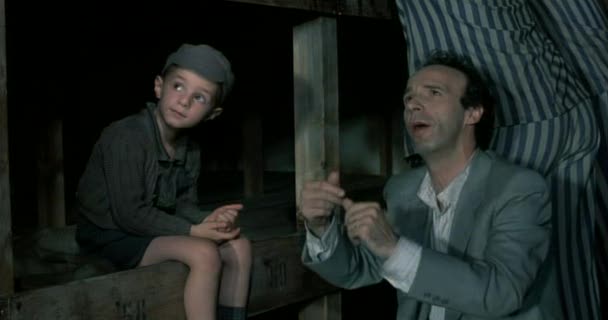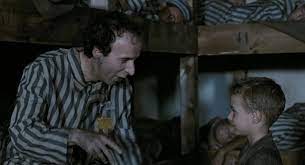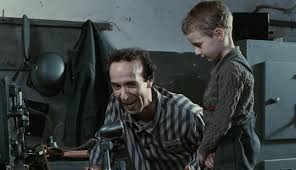Life Is Beautiful (1997)

Life Is Beautiful (1997) Review: A Heartbreaking and Uplifting Tale of Love and Resilience
Life Is Beautiful (La Vita è Bella), directed by and starring Roberto Benigni, is a cinematic masterpiece that blends humor, romance, and tragedy in a way that few films have achieved. Set against the backdrop of World War II, the film tells the poignant story of a father’s unwavering love and determination to protect his son from the horrors of a Nazi concentration camp. With its profound themes, unforgettable performances, and unique tone, Life Is Beautiful remains one of the most celebrated films in cinematic history.
Plot Overview: Love and Sacrifice in the Face of Tragedy
The film is divided into two distinct acts:
- The Romantic Beginning: The story begins in 1939 Italy, where Guido Orefice (Roberto Benigni), a cheerful and resourceful man, arrives in the Tuscan town of Arezzo. Guido’s quick wit and relentless optimism win the heart of Dora (Nicoletta Braschi), a schoolteacher engaged to a wealthy but pompous bureaucrat. Their love story is filled with whimsical charm, culminating in their marriage and the birth of their son, Giosuè.
- The Harrowing Second Act: Years later, Guido, Dora, and Giosuè are deported to a Nazi concentration camp. To shield Giosuè from the horrors around them, Guido concocts an elaborate story, convincing his son that the camp is part of a game. The “rules” involve earning points by following strict guidelines, with the ultimate prize being a real tank. Guido’s humor and creativity transform their grim reality into a surreal adventure, preserving his son’s innocence amid unimaginable cruelty.
Roberto Benigni: A Tour de Force Performance
Roberto Benigni’s portrayal of Guido is nothing short of extraordinary. As the film’s protagonist, Benigni balances comedic brilliance with profound emotional depth. Guido’s relentless optimism and quick-thinking charm are infectious, making his efforts to protect his son both heartbreaking and heroic. Benigni’s physical comedy and expressive acting style infuse the film with a sense of lightness, even in its darkest moments.
Nicoletta Braschi: Grace and Strength
Nicoletta Braschi, Benigni’s real-life wife, delivers a touching performance as Dora. Her character embodies quiet strength and unwavering love, choosing to board the train to the concentration camp with her family despite not being a target. Braschi’s understated portrayal adds a layer of depth and humanity to the story, highlighting the sacrifices made in the name of love.
Giorgio Cantarini: Innocence Amid Tragedy
As Giosuè, young actor Giorgio Cantarini gives a natural and heartfelt performance. His wide-eyed innocence is the emotional anchor of the film, and his interactions with Guido are both heartwarming and devastating. Cantarini’s portrayal captures the resilience of childhood in the face of unimaginable adversity.
Themes: Love, Resilience, and the Power of Imagination
Life Is Beautiful explores profound themes that resonate deeply with audiences:
- Love and Sacrifice: Guido’s devotion to his family drives every decision he makes, from his courtship of Dora to his efforts to shield Giosuè from the camp’s horrors.
- The Power of Imagination: The film emphasizes how humor and creativity can provide solace and strength, even in the darkest times. Guido’s “game” is a testament to the human spirit’s ability to find hope amid despair.
- The Human Cost of War: While the film’s tone is often light, it never shies away from the devastating realities of the Holocaust, presenting them with both subtlety and emotional impact.
Cinematography: Beauty Amid Despair
Tonino Delli Colli’s cinematography is a standout feature of the film. The vibrant, sun-drenched visuals of the first act contrast starkly with the muted, oppressive tones of the concentration camp. This visual dichotomy underscores the film’s tonal shift, enhancing its emotional resonance.
Music: A Hauntingly Beautiful Score
The score, composed by Nicola Piovani, is a central element of the film’s emotional impact. The recurring motif, “Buongiorno Principessa,” is both joyful and melancholic, reflecting Guido’s love for Dora and the bittersweet nature of their story. The music elevates the narrative, leaving a lasting impression on viewers.
Key Moments That Define Life Is Beautiful
- Guido’s Courtship of Dora: From orchestrating chance encounters to stealing her away on horseback, Guido’s pursuit of Dora is a masterclass in romantic comedy.
- The Camp’s “Game”: Guido’s explanation of the “rules” to Giosuè, filled with humor and imagination, is both heartwarming and heartbreaking.
- Guido’s Final Sacrifice: In the film’s most poignant moment, Guido’s commitment to maintaining the illusion of the game for Giosuè culminates in his ultimate sacrifice, a testament to the depth of his love.
Strengths of Life Is Beautiful
- Unique Tone: The film masterfully blends comedy and tragedy, creating an emotional rollercoaster that is both entertaining and deeply moving.
- Memorable Performances: Benigni’s portrayal of Guido is unforgettable, supported by a strong cast that brings authenticity and heart to the story.
- Universal Themes: The film’s exploration of love, hope, and resilience transcends its historical setting, making it timeless and universally relatable.
Criticisms of Life Is Beautiful
- Tone Shifts: Some viewers and critics have found the transition from lighthearted romance to Holocaust drama jarring, though others see it as a strength.
- Historical Simplification: The film has faced criticism for its portrayal of the Holocaust, with some arguing that its comedic elements undermine the gravity of the events depicted.
Legacy and Accolades
Life Is Beautiful was a critical and commercial success, earning widespread acclaim and numerous accolades:
- Academy Awards (1999):
- Best Actor (Roberto Benigni)
- Best Original Score (Nicola Piovani)
- Best Foreign Language Film
- Cannes Film Festival (1998):
- Grand Prix
The film’s ability to address a topic as harrowing as the Holocaust with humor and grace has made it a lasting cultural touchstone.
Conclusion: A Masterpiece of Emotion and Storytelling
Life Is Beautiful is a rare film that manages to find beauty in the bleakest of circumstances. Roberto Benigni’s heartfelt performance, combined with the film’s unique tone and universal themes, creates a cinematic experience that is as inspiring as it is heartrending. While it may not be without its critics, the film’s message of love and resilience continues to resonate, making it a timeless classic.